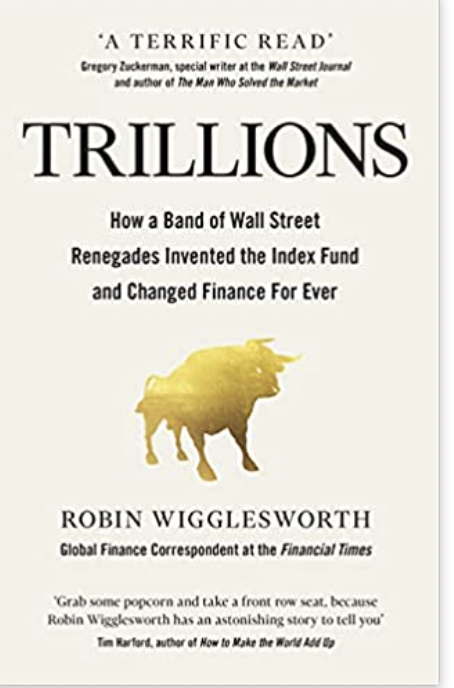
Index Funds democratised by finance


Financial Times journalist Robin Wiggleworth, reveals the secret history of Index Funds, bringing to life the colourful characters behind their birth, growth and evolution into a world-conquering phenomenon, a story of the most pressing financial uncertainties of our time.
In 1971, an unlikely group quietly assembled in the financial industry’s backwaters, unified by the heretical idea that even the world’s best investors couldn’t beat the market in the long run including economical wunderkind Gene Farna, industry executive Jack Bogle, computer obsessive John McQuown and former Second World War submariner Nate Most, the group succeeded beyond their widest dreams. Passive investment now likely accounts for over $26 trillion, equal to the entire gross domestic product of the US, and today is a force reshaping markets, finance and even capitalism itself.
Some fans of Index Funds and ETFs are growing perturbed that their swelling heft is destabilising markets, wrecking the investment industry and leading to an unwelcome concentration of power in fewer and fewer hands.
In 2009, Paul Volcker, former chair of the US Federal Reserve, berated financiers by saying that the only useful financial innovation in recent decades is the ATM.
According to Wiggleworth Index Fund is the financial product of choice for millions of investors, as low cost means of tracking markets have democratised investing, revolutionised financial structures and even changed capitalism.
Today $26tn is invested on Index Funds a quarter of all managed funds.
“The history of investing is essentially a chronicle of code-breaking and not all revolutions are bloody takeovers on a day in May, some creeps up slowly.”Wiggleworth explains.
The first index fund launched in 1970s with academics who forged the underpinnings of a diversified portfolio and index construction, well before we meet the heroes.
Wigglesworth illuminates how all aspects investing have been transformed by indexation and see anxiety, obsessiveness, and isolation of those on a mission to launch a new way of investing. He also explains how scrappy revolutionaries have had to adapt as they became the new ruling class.
Indexation has saved investors hundreds of billions of dollars, sums that will undoubtedly reach trillions. Fees on Index funds are often less than those of active portfolio. The investment industry would polarise into barbell shape, with investors flocking to cheap passive index funds, and would seek higher returns in private equity , hedge funds and other specialised strategies.
True investors have saved billions via index funds, and spent almost all fees they freed up on higher yielding strategies.
Wigglesworth manages to bring life to boardroom bust up that led to birth of Vanguard or BlackRock’s “Deal of the Decade” acquisition of Barclay’s Index fund unit BGI in 2009, sold to raise cash during the financial crisis. The unit is worth now whole of Barclays.
Trillions is chronological history of a transformation that is no means over, as Index investing has become so mainstream. Companies are seeking to address the conundrums of hoe Index firms should cast their votes as shareholders in corporate governance, as the recent case of shareholder activism at Exxon.
We are living through investment revolution as technolgoy continues to transform how we invest, as Trillions is a must read book.
Trillions: How a Band of Wall St Renegades Invented the Index Fund and Changed Finance by Robin Wigglesworth, Penguin Business £25, Portfolio $30, 352 pages.
